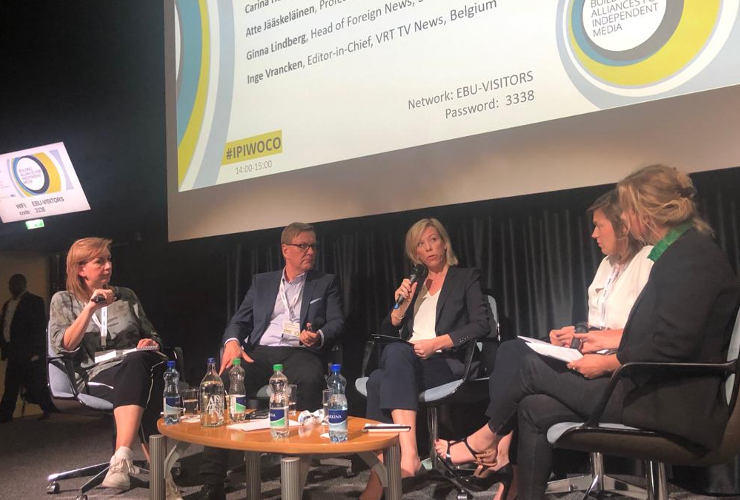Trust in media tends to peak during times of crisis. But how do public service media (PSM) maintain this degree of trust when society is not at crisis-point? Last week, the panel “Trust in Public Service Media in Shifting Times – Ways to Make It Better” at the International Press Institute (IPI)’s 2019 World Congress in Geneva, Switzerland, dissected strategies to cement trust and offered participants key insights into the European Broadcasting Union (EBU)’s 2019 “Trust in Media” report.
Missed the #IPIWoCo? Watch the panel discussions on our YouTube channel
EBU’s report revealed that trust in PSM in Europe is already very high; PSM are among the top five most trusted news brands in over 80 percent of Northern and Central European markets. During their discussion on how to strengthen this existing trust, panelists Ginna Lindberg, head of Foreign News at Sveriges Radio in Sweden; Professor Atte Jääskeläinen of Finland’s LUT University; Inge Vrancken, editor-in-chief of VRT TV News in Belgium; and Carina Haupt, an EBU media analyst focused their comments on the importance of ascertaining audience needs and resisting complacency. Four themes permeated the conversation: self-reflection, innovation, meeting your audience, and story-telling.
Self-reflection is crucial to building public trust on solid ground. “We are human and we make mistakes. We just have to say: this is where we went wrong, and correct it”, Vrancken said. She pointed out that VRT TV News added an ombudsman in 2017 who answers reader questions or criticisms and thus “keeps people sharp in the newsroom”.
“We need to come out of our journalistic bubble and be where the audience is”, @vrancki of @vrtnws says on building trust in public media at #IPIWoCo.@vrtnws is investing in young audiences, with new projects on Instagram and YouTube. @EBU_HQ pic.twitter.com/5CmKOd36OV
— IPI (@globalfreemedia) June 5, 2019
Other important points to reflect on are the use of technical language that risks alienating some readers, and newsroom diversity. Jääskeläinen pointed out that diversity is a layered and complex issue that cannot be reduced to gender or socio-economic status: “Even with a diverse newsroom, there can still be shadows. Watch for the shadows, be sensitive, and listen”, he advised.
Innovation is also fundamental to trust in PSM during shifting times, panellists said. As Lindberg summarized, “We have to constantly fight to gain trust. And we need resources to do that kind of in-depth journalism.”
Panellists said that news outlets needed to meet audiences where they are. In the current landscape, this means investing in podcasts and social media like Instagram. Lindberg observed: “Good storytelling combined with fact-checking and a good issue is a recipe for success.” This model has been heartily adopted in Belgium by VRT TV News, which has created an Instagram account covering topical news for teenagers entitled “News News News” and started broadcasting mini-documentaries exclusively on YouTube.
Perhaps trustworthy behavior is insufficient and news organizations must in fact market those values, suggested Jääskeläinen. He also criticized the practice of molding journalistic interviews to fill a pre-written narrative; “If we go out to get stories we already know, we get stories that are predictable. Go out without an agenda and get exciting stories!”.
That is the mentality that underpins #TenMillion, a recent project at Swedish public service broadcaster Sveriges Radio. Lindberg told the Congress that “too often, reporters already know the answer to the question. You go out, you have the headline, and you’re looking for the case. We decided to change that. We simply asked people; what are your concerns? What makes you happy? What do you think about?” The answers to those questions often surprised Sveriges Radio – their listeners were significantly more concerned with traffic and healthcare than with the economy and migration.
“To gain the public’s trust, we need to be fast, we need to be right and we need to be where the audience is”, @GinnaLindberg of @sverigesradio at #IPIWoCo panel on trust in public service broadcasting @EBU_HQ pic.twitter.com/k7vl5j3pP6
— IPI (@globalfreemedia) June 5, 2019
Jääskeläinen also summarized findings from EBU’s 2018 “50 Ways to Make It Better” report, which offers strategies to approach a range of challenges, including attracting digital consumers, faults in the journalistic profession, media under attack, and how to get closer to the audience and further from power.
When it comes to responding to attacks on the media, the report emphasizes the value of building alliances, promoting media literacy, and being transparent about mistakes. Given the ways that mainstream media are increasingly perceived as “elites” and social media is exacerbating divisions, panellists argued that it is vital for news organizations to meet audiences on their level. That is why journalists at Sveriges Radio recently embarked on a six-week road-trip across the country, asking citizens the fundamental question: What do you want from us?



